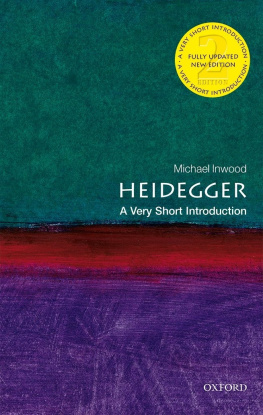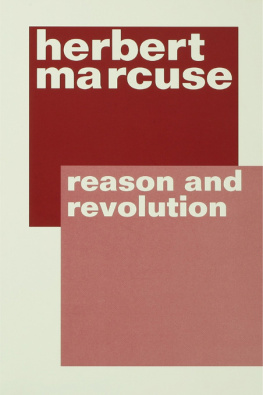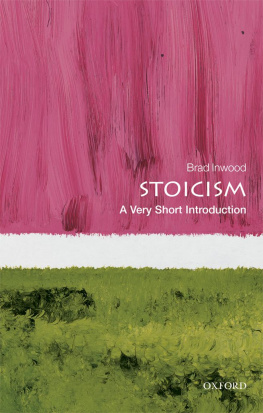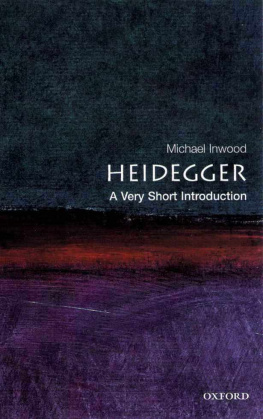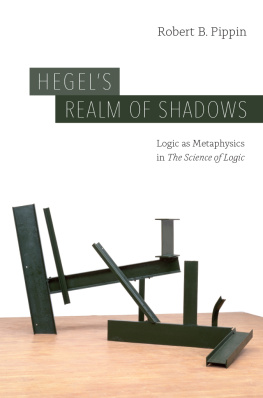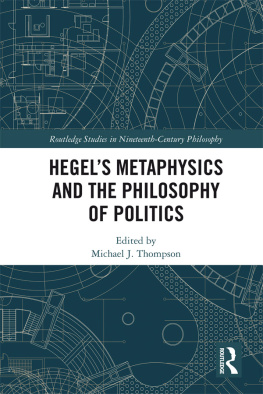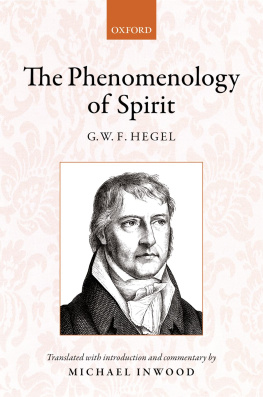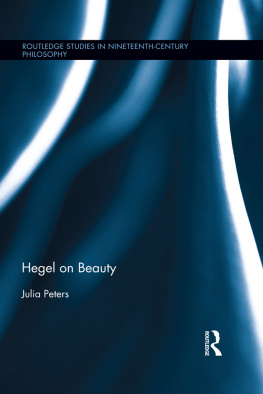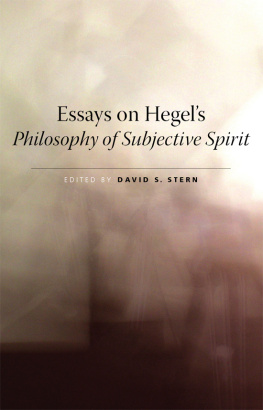A COMMENTARY ON HEGELS PHILOSOPHY OF MIND
Michael Inwood, an eminent scholar of German philosophy, presents a full and detailed new commentary on a classic work of the nineteenth century. Philosophy of Mind is the third part of Hegels Encyclopaedia of the Philosophical Sciences, in which he summarizes his philosophical system. It is one of the main pillars of his thought. Inwood gives the clear and careful guidance needed for an understanding of this challenging work. In his editorial introduction he offers a philosophically sophisticated evaluation of Hegels ideas which includes a survey of the whole of his thought and detailed analysis of the terminology he used. This volume is issued simultaneously with a companion volume containing Inwoods translation of the Philosophy of Mind.
Michael Inwood is Fellow and Tutor in Philosophy at Trinity College, Oxford.
A Commentary on Hegels Philosophy of Mind
M. J. INWOOD


Great Clarendon Street, Oxford OX2 6DP
Oxford University Press is a department of the University of Oxford.
It furthers the Universitys objective of excellence in research, scholarship,
and education by publishing worldwide in
Oxford New York
Auckland Cape Town Dar es Salaam Hong Kong Karachi
Kuala Lumpur Madrid Melbourne Mexico City Nairobi
New Delhi Shanghai Taipei Toronto
With offices in
Argentina Austria Brazil Chile Czech Republic France Greece
Guatemala Hungary Italy Japan Poland Portugal Singapore
South Korea Switzerland Thailand Turkey Ukraine Vietnam
Oxford is a registered trade mark of Oxford University Press
in the UK and in certain other countries
Published in the United States
by Oxford University Press Inc., New York
Michael Inwood 2007
The moral rights of the author have been asserted
Database right Oxford University Press (maker)
First published 2007
First published in paperback 2010
All rights reserved. No part of this publication may be reproduced,
stored in a retrieval system, or transmitted, in any form or by any means,
without the prior permission in writing of Oxford University Press,
or as expressly permitted by law, or under terms agreed with the appropriate
reprographics rights organization. Enquiries concerning reproduction
outside the scope of the above should be sent to the Rights Department,
Oxford University Press, at the address above
You must not circulate this book in any other binding or cover
and you must impose the same condition on any acquirer
British Library Cataloguing in Publication Data
Data available
Library of Congress Cataloging in Publication Data
Data available
Typeset by Laserwords Private Limited, Chennai, India
Printed in Great Britain
on acid-free paper by
Biddles Ltd., Kings Lynn, Norfolk
ISBN 9780199575664 (pbk.)
1 3 5 7 9 10 8 6 4 2
Abbreviations
DGS | Dictionary of German Synonyms, by R. B. Farrell (3rd edn.: Cambridge: Cambridge University Press, 1977) |
Enc. | Hegels Encyclopaedia of the Philosophical Sciences in Outline. The three parts are usually published separately. The first part (Enc. I)is translated by William Wallace as The Logic of Hegel (2nd edn.: Oxford: Oxford University Press, 1892) and by T. F. Geraets, W. A. Suchting and H. S. Harris as The Encyclopaedia Logic (Indianapolis: Hackett, 1991). The second part (Enc. II) is translated by A. V. Miller as Hegels Philosophy of Nature: Being Part Two of the Encyclopaedia of the Philosophical Sciences (1830; Oxford: Oxford University Press, 1970) and by M. Petry as Philosophy of Nature (London: Allen & Unwin, 1970). The third part (Enc. III) is translated by W. Wallace and A. V. Miller as Hegels Philosophy of Mind (Oxford: Oxford University Press, 1971) and in part by M. Petry as The Berlin Phenomenology (Dordrecht: Reidel, 1981). These works translate the third (1830) edition of Enc., but also translate the Zustze. In my quotations from Enc. I, I have usually followed Wallaces translation |
HP | Lectures on the History of Philosophy, 3 vols., trans. E. S. Haldane and F. H. Simson (London: K. Paul, Trench, Trubner, 18926; repr. London: University of Nebraska Press, 1995) |
ILA | Introductory Lectures on Aesthetics, trans. B. Bosanquet, ed. M. Inwood (Harmondsworth: Penguin, 1993). This is Hegels introduction to his lectures. The complete text is translated by T. M. Knox as Hegels Aesthetics: Lectures on Fine Art (Oxford: Oxford University Press, 1975) |
LPR | Lectures on the Philosophy of Religion, 3 vols., trans. E. Speirs and J. Sanderson (London: K. Paul, Trench, Trubner, 1895) |
PH | The Philosophy of History, trans. J. Sibree (New York: Dover, 1956). This is the only complete translation of Hegels lectures on world history |
PR | Philosophy of Right, trans. T. M. Knox (Oxford: Oxford University Press, 1957). Also translated by H. Nisbet as Elements of the Philosophy of Right, ed. A. Wood (Cambridge: Cambridge University Press, 1991). Hegels major work on ethics and politics. As in the case of the Encyclopaedia, Hegels posthumous editor added Zustze or additions from lectures |
PS | Phenomenology of Spirit, trans. A. V. Miller (Oxford: Oxford University Press, 1977) |
SL | Science of Logic, trans. A. V. Miller (London: Allen & Unwin, 1969) |
Editors Introduction
This book is concerned with Geist. Geist is both mind and spirit. It is the mind of an individual. It is the spirit of a people. It is art, religion, and philosophy. It is the Holy Spirit. Geist is the dominant concept in Hegels philosophy. It propels his thought onward and upward. Geist itself, in Hegels view, propels humanity onward and upward. If there is any secret of Hegel, that secret is Geist. But what is Geist? Can it bear all the meanings Hegel assigns to it? Can it perform the multitude of tasks that Hegel requires of it? Such are the questions that this Introduction attempts to answer.
HEGEL
Georg Wilhelm Friedrich Hegel was born in Stuttgart in 1770. After leaving the local high school, he enrolled in the philosophy faculty of Tbingen university in 1788, but later transferred to the theological faculty with the aim of becoming a Lutheran pastor. On graduating in 1793, he followed the common practice of serving as a private tutor to the children of a wealthy family, first in Berne and later in Frankfurt. During this period he wrote some essays on Christianity, which in general regret, and attempt to explain, its degeneration into a positive religion, a religion of prescribed dogmas, rules, and rituals, in contrast to the folk-religion of ancient Greece that it supplanted. The most important of these essays, The Spirit of Christianity and its Fate, argued that Jesus originally preached a religion of love, but that it had to become a religion of law, a positive religion, in order to convert mankind. Despite the occurrence of the word spirit (
Next page

